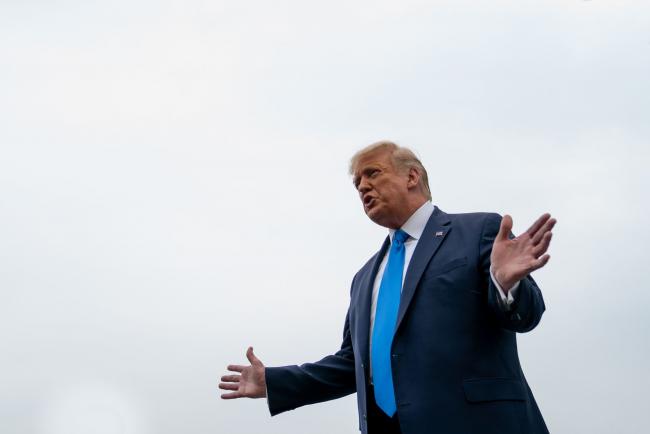(Bloomberg) -- House Speaker Nancy Pelosi and Treasury Secretary Steven Mnuchin Tuesday discussed the latest Democratic stimulus proposal in talks that will determine whether another coronavirus relief package gets enacted before the election.
The negotiations between the Trump administration and congressional Democrats are reaching a critical juncture this week as both sides either manage to reach a deal or the House moves to pass the Democratic proposal and leave town for pre-election campaigning.
House Democrats released their latest plan, a $2.2 trillion package that the White House greeted initially with silence.
Pelosi and Mnuchin spoke Tuesday morning for 50 minutes to go over provisions of the Democratic proposal, and hey plan to speak again Wednesday, according to Pelosi’s spokesman.
While the details of the legislative text add clarity to the talks, the top-line spending level is no closer to what Republicans say they’ll support. President Donald Trump has indicated he could agree to as much as $1.5 trillion in aid -- more than the $650 billion put forth in a “skinny” aid package by Senate Republicans earlier this month.
Should no deal be forthcoming, House Democrats have said they intend to proceed on their own to vote on the new plan, allowing the party’s candidates in the Nov. 3 elections to highlight their action on coronavirus relief. The last vote was on the bigger, $3.4 trillion Heroes Act back in May, which the Senate didn't take up.
The negotiations have been at an impasse since August.
White House economic adviser Larry Kudlow, speaking on CNBC Tuesday morning, said the true cost of the Democrats’ bill is more like $2.6 trillion and about one-third of it is related to subjects that Republicans don’t believe are strictly tied to the pandemic.
“We have a number of asks that I think both sides would agree with -- four, five, six asks that would really help the economy,” including expanded small business aid, funding for schools, supplemental unemployment payments and airline aid, he said.
“For some reason, we just can’t get it done, but the conversation, the talks will continue,” Kudlow said. “The other team wants a gigantic package and we don’t think we need that.”
Pelosi said Monday that the White House would have to agree to “much more” spending for a fresh round of stimulus if there is any hope of striking a deal before the election. “We can get this done,” Pelosi said Monday on MSNBC, while emphasizing the need for more money.
A key source of division has been Democrats’ push for large-scale aid to state and local authorities. The plan released Monday has $436 billion for one year of assistance, less than a previous demand for $915 billion, which had triggered scorn among Trump administration officials who called it a bailout for poorly run states.
The Democratic plan includes new aid for airlines, restaurants and small businesses that wasn’t in the original House package, and it has more than double the amount for schools.
The bill would provide another round of $1,200 direct relief payments to individuals and $500 per dependent -- less than the $1,200 for dependents Democrats originally proposed. It also has $600 per week in extra unemployment benefits through January, the same amount that expired in July and helped disposable incomes surge even as the economy tipped into recession.
Housing Aid, Virus Testing
The legislation continues the Heroes Act’s aims of bolstering housing assistance, with tens of billions of dollars to assist renters and homeowners make monthly rent, mortgage and utility payments.
Also included is $75 billion for coronavirus testing, contact tracing and isolation measures, along with $28 billion for procurement, distribution and education campaigns for a safe and effective vaccine.
Democrats have also cut spending demands on hazard pay for essential workers, housing assistance, health insurance and the Postal Service.
With the Senate under Republican control, and its leaders now pre-occupied with Trump’s nomination of Judge Amy Coney Barrett to the Supreme Court, the bill is unlikely to advance without a major turnaround in the Trump administration’s position.
Private economists have increasingly abandoned forecasts for a deal before the election. JPMorgan Chase (NYSE:JPM) & Co. andGoldman Sachs Group Inc. recently cut their forecasts for growth next quarter as a consequence.
©2020 Bloomberg L.P.
